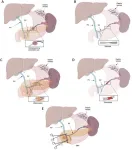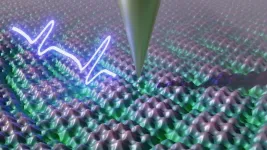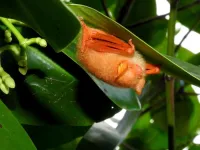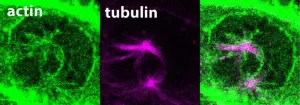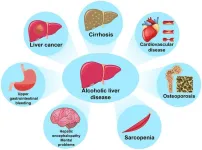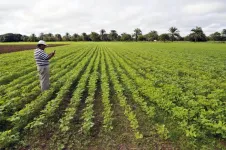(Press-News.org) The winners of the 2024 EurekAlert! Travel Awards are Pavla Hubálková, a Czech science journalist at WIRED.CZ, and Iris Duțescu, a Romanian freelance science journalist.
An independent panel of three judges with regional science journalism expertise selected the winners. Both awardees will receive travel support from EurekAlert! to attend the 2025 Annual Meeting of the American Association for the Advancement of Science (AAAS) in Boston, Mass., where they will have opportunities to cover the latest scientific research and make connections with scientists and communicators from around the globe.
EurekAlert! is a nonprofit, editorially independent news release distribution service. AAAS is EurekAlert!’s parent organization.
The program was previously known as the EurekAlert! Fellowships for International Science Reporters. Now, on the 20th anniversary of its launch, the program has been renamed the EurekAlert! Travel Awards to better reflect the type of opportunity the award provides for early-career science journalists in low- and middle-income countries.
The theme of the 2025 AAAS Annual Meeting is “Science Shaping Tomorrow.” Fittingly, both awardees are already contributing to shaping the future of science journalism and communication in their home countries.
Hubálková coauthored the first Czech-language book on science communication in 2023 and regularly hosts workshops for scientists and public information officers. Duțescu’s reports on cutting-edge topics, including the uses of AI in contemporary medicine and technology in education, have been published in a number of well-known Romanian news outlets.
This year’s travel awards were open to applicants from the Balkans and, for the first time in the program’s history, countries of Eastern Europe.
“The decision to expand the reach of the travel awards to Eastern Europe this year is a nod to the region’s growing role in the scientific community, including hosting the upcoming World Science Forum in Budapest, Hungary,” said Jennifer Holshue, EurekAlert!’s deputy director who oversees the program. “It’s a perfect opportunity for EurekAlert! to engage directly with journalists in this part of the world.”
Speaking to the value of the EurekAlert! Travel Awards, judge Andrada Fiscutean, a Romanian science and technology reporter, said: “The program helps cultivate a new generation of passionate science reporters in Eastern Europe and the Balkans, regions where science journalism training is still limited. The reporters selected for the EurekAlert! Travel Award will contribute to the overall improvement of science literacy and public understanding of science in their regions.”
Meet the award winners
Both winners are forward-thinking journalists with wide-ranging experience, knowledge and expertise in various subjects, and strong commitments to advancing science journalism and communications in their respective countries.
Pavla Hubálková (she/her) is the science editor at WIRED.CZ and contributes articles about science and research to Forum, the popular print and online magazine published by Charles University in Prague. Originally, she thought she would become a scientist, so she studied clinical biochemistry at the University of Chemistry and Technology in Prague and completed her Ph.D. in neuroscience at the Third Faculty of Medicine, Charles University. During her Fulbright internship at Northwestern University in Chicago, however, she discovered that she wanted to work in science communication.
“It is my great pleasure and honor to receive this award,” Hubálková said. “This will provide me with invaluable opportunities to learn about current leading scientific topics from top scientists and researchers in their fields. Since science communication is not yet well established in the Czech Republic, I am also excited to draw inspiration and motivation from the international network of science communicators. As a science editor at WIRED.CZ, I look forward to writing about my findings to share them with a wider audience.”
Iris Duțescu (she/her) is a freelance science journalist whose journey into science communication began during her first year of university when she participated in a course titled “Technology in Today’s Media.” It was during this time that she published her first piece of science journalism, covering the discovery of water in a distant galaxy. Since then, Duțescu has delved into diverse scientific subjects such as the role of AI in contemporary medicine, the use of technology for educational purposes, and science denialism. Alongside her studies, she has contributed as a freelance journalist to various well-known Romanian publications and media outlets including Mindcraft Stories, Școala9, Libertatea, Observator, and Gen, Știri. Duțescu graduated this year from the University of Bucharest.
“To me, this award is a transformative opportunity both personally and professionally, validating my efforts and dedication to science communication,” Iris said. “[It] signifies recognition of my passion for making science accessible and engaging to a broad audience. Coming from an Eastern European country, I have faced numerous challenges in pursuing my career. This award not only acknowledges my hard work but also empowers me to overcome these barriers, fueling my commitment to advocate for diversity, equity, and inclusion in science journalism.”
To learn more about the travel awards and previous winners, visit eurekalert.org/travelawards.
###
About the Judges
Andrada Fiscutean (she/her)
Andrada Fiscutean is a freelance science and technology journalist based in Bucharest, Romania. She has written for Ars Technica, CSO Online, Nature, The Guardian, Foreign Policy, Motherboard & more. She is the editor-in-chief of ProFM Radio in Bucharest and a regular contributor to BBC World Service’s science show, Unexpected Elements. In 2019-20, Andrada was a Knight Science Journalism Fellow at the Massachusetts Institute of Technology (MIT) in Cambridge, Mass., USA. She teaches science journalism and explanatory journalism at the University of Bucharest.
Milica Momčilović (she/her)
Milica Momčilović is a science journalist and editor, author, and TV anchor at Radio Television of Serbia. She holds the position of editor in science programming and writes science articles for Politika, the oldest daily newspaper in Serbia. As a journalist in TV and print media, she has developed a special interest in establishing partnerships with scientists and their institutes as one of the models for successful reporting on science and mutual capacity building. Milica was the President of the World Federation of Science Journalists from 2019 to 2023.
Mićo Tatalović (he/him)
Mićo Tatalović is a UK news editor for the Research Professional News website and for Research Fortnight magazine in London. He previously worked as a science news editor at SciDev.Net, New Scientist, and Nature, and was the chairman of the Association of British Science Writers for a few years.
He is originally from Rijeka, Croatia, and is still actively involved in promoting science journalism in the region. Mićo holds a B.A. degree in biology from the University of Oxford, an M.Phil. in zoology from the University of Cambridge, and an M.Sc. in science communication from Imperial College London. He has also completed the prestigious Knight Science Journalism fellowship at MIT, in Cambridge, U.S.
About EurekAlert!
EurekAlert! is an editorially independent news release distribution platform operated by the nonprofit American Association for the Advancement of Science (AAAS). The platform, launched in 1996, was created to facilitate the sharing and independent reporting of peer-reviewed scientific research and other stories from the scientific enterprise. Supported by content submission fees and free for working journalists to use, EurekAlert! has served tens of thousands of science journalists, publishers, and research institutions worldwide through its distribution service and other mission-driven programs that support advancing science journalism and communication.
About AAAS and the Annual Meeting
Founded in 1848, the American Association for the Advancement of Science is the world’s largest multi-disciplinary science society, fulfilling its mission to advance science, engineering, and innovation throughout the world for the benefit of all people through a broad array of initiatives focused on communication, public engagement, education, scientific responsibility, public policy, and science diplomacy.
Each year, thousands of leading scientists, educators, policymakers, and journalists gather to discuss cutting-edge developments in science, technology, and policy. The next AAAS Annual Meeting will convene in Boston, Mass., February 13-15, 2025.
END
EurekAlert! Travel Awards recognize early-career science journalists in Eastern Europe for the first time
The two winners, who will attend the 2025 AAAS Annual Meeting, were selected from among applicants from the Balkans and Eastern Europe
2024-07-16
ELSE PRESS RELEASES FROM THIS DATE:
Etiologies of splenic venous hypertension
2024-07-16
Splenic venous hypertension (SVH), also known as left-sided portal hypertension, is a rare condition characterized by upper gastrointestinal (GI) bleeding in the absence of liver disease. This condition arises due to increased pressure in the splenic vein (SV), causing blood to drain through the short gastric veins to the stomach, leading to the dilation of submucosal structures and the formation of gastric varices. Unlike traditional portal venous hypertension (PVH), SVH does not involve elevated pressures in the main portal vein and is primarily an extrahepatic condition. Diagnosing SVH requires ...
Breakthrough in quantum microscopy: Stuttgart researchers are making electrons visible in slow motion
2024-07-16
"With the method we developed, we can make things visible that no one has seen before," says Prof. Sebastian Loth, Managing Director of the Institute for Functional Matter and Quantum Technologies (FMQ) at the University of Stuttgart. "This makes it possible to settle questions about the movement of electrons in solids that have been unanswered since the 1980s." However, the findings of Loth's group are also of very practical significance for the development of new materials.
Tiny changes with macroscopic consequences
In ...
E-sales of a wild bat sold as décor threaten species
2024-07-16
A fiery orange bat, its wings folded and tiny teeth forever bared on its fuzzy face, is mounted inside a 6-inch, black coffin. Its retail price: $59. Or, for $140, you can get one framed with its black and orange wings spread, deliverable in two days.
Despite declining numbers in the wild, hundreds of specimens like this of Kerivoula picta—or painted woolly bat—are being sold on Etsy, eBay and Amazon as jewelry, Halloween decorations, and jarred curios.
A study published July 9 in the European Journal of Wildlife Research found “abundant evidence that ...
Social media polls deliberately skew political realities of 2016, 2020 US presidential elections, finds research team led by UMass Amherst
2024-07-16
AMHERST, Mass. – Informal political polls conducted on X/Twitter during both the 2016 and 2020 U.S. presidential elections were significantly skewed by questionable votes, many of which may have been purchased from troll farms. This conclusion, reached by a team of scientists led by Przemyslaw (Przemek) Grabowicz, research assistant professor at the University of Massachusetts Amherst, shows that X/Twitter’s poll system deliberately reports biased public vote counts. On average, the results of such questionable polls favored Donald Trump over Joe Biden, 58% to 42% in a head-to-head comparison, during 2020.
The team additionally found that ...
Unique characteristics of previously unexplored protein discovered
2024-07-16
An international research collaboration, led by Prof. Dr. Robert Grosse (Centre for Integrative Biological Signalling Studies and Institute of Clinical and Experimental Pharmacology and Toxicology, University of Freiburg), Dr. Libor Macurek (Institute of Molecular Genetics, Czech Academy of Sciences, Prague) and Dr. Zdenek Lansky (Institute of Biotechnology, Czech Academy of Sciences, Prague) has uncovered a new mechanism of the crosstalk between microtubules and actin cytoskeleton during cell division and ...
Alcoholic liver disease in China: A disease influenced by complex social factors that should not be neglected
2024-07-16
Alcoholic liver disease (ALD) is a major cause of liver-related morbidity and mortality globally. Chronic alcohol consumption, a primary driver of ALD, leads to a spectrum of liver conditions ranging from fatty liver to cirrhosis and hepatocellular carcinoma. In China, the incidence of ALD has been rising at an alarming rate, reflecting the country's rapid economic growth and changing social norms around alcohol consumption. This paper explores the complex social factors influencing ALD in China, the complications ...
Foreign direct investments may fuel tropical deforestation
2024-07-16
Foreign direct investments (FDI) in tropical countries in extractive industries like mining, logging and fossil fuels have a long, environmentally destructive track record in tropical countries. Are FDI in food systems another extractive industry?
Highlights:
Foreign direct investment (FDI) in food systems are a major contributor to deforestation in tropical countries, an advanced machine learning model shows
Laws requiring deforestation-free exports are welcome but likely address only a fraction of forest loss potentially linked to FDI in food systems in domestic markets
Better regulation of FDI in domestic food production is needed to save more forest ...
Timing is everything: Study finds link between bowel movement frequency and overall health
2024-07-16
SEATTLE – Everybody poops, but not every day. New research by the Institute for Systems Biology (ISB) suggests bowel movement frequency is linked to long-term health.
An ISB-led research team examined the clinical, lifestyle, and multi-omic data of more than 1,400 healthy adults. How often people poop, they found, can have a large influence on one’s physiology and health. Their findings will be published in the Cell Reports Medicine on July 16.
Researchers explored data from consenting participants of the consumer wellness company Arivale. The ...
Hormone therapy for breast cancer linked with lower dementia risk
2024-07-16
Hormone modulating therapy (HMT) used for the treatment of breast cancer was associated with a 7% lower risk of developing Alzheimer’s disease and related dementias later in life, according to a new study published today in JAMA Network Open.
The study, which is one of the largest of its kind, found that although HMT was linked with protection against the development of dementia overall, the association decreased with age and varied by race.
“Our findings emphasize the importance of being cognizant of individual patient factors when we prescribe medications or develop treatment plans for breast cancer,” said senior author Francesmary Modugno, Ph.D. M.P.H., ...
Alzheimer disease and related dementia following hormone-modulating therapy in patients with breast cancer
2024-07-16
About The Study: In this retrospective cohort study, hormone therapy was associated with protection against Alzheimer disease and related dementias in women age 65 or older with newly diagnosed breast cancer; the decrease in risk was relatively greater for Black women and women under age 75, while the protective effect of hormone-modulating therapy (HMT) diminished with age and varied by race in women. When deciding to use HMT for breast cancer in women age 65 years or more, clinicians should consider age, self-identified race, and HMT type in treatment decisions.
Corresponding ...
LAST 30 PRESS RELEASES:
Evidence behind intermittent fasting for weight loss fails to match hype
How AI tools like DeepSeek are transforming emotional and mental health care of Chinese youth
Study finds link between sugary drinks and anxiety in young people
Scientists show how to predict world’s deadly scorpion hotspots
ASU researchers to lead AAAS panel on water insecurity in the United States
ASU professor Anne Stone to present at AAAS Conference in Phoenix on ancient origins of modern disease
Proposals for exploring viruses and skin as the next experimental quantum frontiers share US$30,000 science award
ASU researchers showcase scalable tech solutions for older adults living alone with cognitive decline at AAAS 2026
Scientists identify smooth regional trends in fruit fly survival strategies
Antipathy toward snakes? Your parents likely talked you into that at an early age
Sylvester Cancer Tip Sheet for Feb. 2026
Online exposure to medical misinformation concentrated among older adults
Telehealth improves access to genetic services for adult survivors of childhood cancers
Outdated mortality benchmarks risk missing early signs of famine and delay recognizing mass starvation
Newly discovered bacterium converts carbon dioxide into chemicals using electricity
Flipping and reversing mini-proteins could improve disease treatment
Scientists reveal major hidden source of atmospheric nitrogen pollution in fragile lake basin
Biochar emerges as a powerful tool for soil carbon neutrality and climate mitigation
Tiny cell messengers show big promise for safer protein and gene delivery
AMS releases statement regarding the decision to rescind EPA’s 2009 Endangerment Finding
Parents’ alcohol and drug use influences their children’s consumption, research shows
Modular assembly of chiral nitrogen-bridged rings achieved by palladium-catalyzed diastereoselective and enantioselective cascade cyclization reactions
Promoting civic engagement
AMS Science Preview: Hurricane slowdown, school snow days
Deforestation in the Amazon raises the surface temperature by 3 °C during the dry season
Model more accurately maps the impact of frost on corn crops
How did humans develop sharp vision? Lab-grown retinas show likely answer
Sour grapes? Taste, experience of sour foods depends on individual consumer
At AAAS, professor Krystal Tsosie argues the future of science must be Indigenous-led
From the lab to the living room: Decoding Parkinson’s patients movements in the real world
[Press-News.org] EurekAlert! Travel Awards recognize early-career science journalists in Eastern Europe for the first timeThe two winners, who will attend the 2025 AAAS Annual Meeting, were selected from among applicants from the Balkans and Eastern Europe

